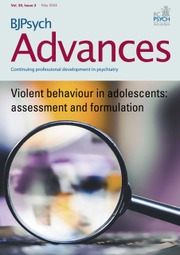- ISSN: 2056-4678 (Print), 2056-4686 (Online)
- Frequency: 6 issues per year
Digital archives
Digital archives are available for this journal, providing instant online access to a repository of high-quality digitised historical content. For more information, please see the Cambridge journals digital archive.
Content preservation
Cambridge University Press publications are deposited in the following digital archives to guarantee long-term digital preservation:
- CLOCKSS (journals)
- Portico (journals and books)
Focus
BJPsych Advances has been designed to meet the continuing professional development needs of consultant psychiatrists and practising mental health professionals.
Mission
The journal is committed to improving doctors’ effectiveness and confidence when treating patients by providing essential reading on current ideas, techniques and developments in psychiatry.
Audience
BJPsych Advances is essential reading for consultant psychiatrists and mental health professionals who need to be kept informed of current ideas, techniques and developments in psychiatry. It is available online to current members of the Royal College of Psychiatrists and members may order a discounted print subscription directly from the publisher.
Please see Subscribe to BJPsych Advances for further information.
To sign up for eTOC alerts and receive the latest journal issue information log in to Cambridge Core and click the 'bell' icon in the upper right corner of the page.
Ownership & Management
The journal is owned and managed by the Royal College of Psychiatrists and published bimonthly by Cambridge University Press on behalf of the College. The College grants editorial freedom and independence to the Editor-in-Chief of BJPsych Advances.
Revenue Sources
Both the Royal College of Psychiatrists and Cambridge University Press are not-for-profit organisations, committed to fulfilling their respective objectives of securing the best outcomes for people with mental illness, learning difficulties and developmental disorders and advancing learning, knowledge and research worldwide.
BJPsych Advances receives revenue to ensure we can maintain the highest publishing quality and standards. Revenue sources include: individual and institutional subscriptions; sales of reprints, rights and royalties; and open access fees. For details on how we avoid charging subscribers for content that has been made Open Access through the payment of an Article Processing Charge ('double dipping'), please see our transparent pricing policy.
Press and Embargoes
Upon acceptance, BJPsych Advances articles may be selected for press release by the author's institution, the RCPsych media team ([email protected]), or CUP media team ([email protected]). The press release will be distributed under strict embargo, usually with advance access to the full article. Those registered to receive our press releases understand that the embargo is a strict one, and that no information about the article can be published or broadcast until the embargo has lifted. Journalists can contact the authors for comment or further details before the embargo date.
Disclaimer
BJPsych Advances is not responsible for statements made by contributors. Unless so stated, material in this journal does not necessarily reflect the views of the Editor or the Royal College of Psychiatrists. The publishers are not responsible for any error of omission or fact.
- On the cover
-
Cover image In this issue (73–81), authors Neil Armstrong and Nicola Byrom suggests a constructive role for anthropology in mental health research, using ethnographic evidence and theory to show how, although they have their uses, mental health scales should not be regarded as inert or harmless.
©istock/DrAfter123

